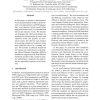Free Online Productivity Tools
i2Speak
i2Symbol
i2OCR
iTex2Img
iWeb2Print
iWeb2Shot
i2Type
iPdf2Split
iPdf2Merge
i2Bopomofo
i2Arabic
i2Style
i2Image
i2PDF
iLatex2Rtf
Sci2ools
ACL
2009
2009
An Error-Driven Word-Character Hybrid Model for Joint Chinese Word Segmentation and POS Tagging
In this paper, we present a discriminative word-character hybrid model for joint Chinese word segmentation and POS tagging. Our word-character hybrid model offers high performance since it can handle both known and unknown words. We describe our strategies that yield good balance for learning the characteristics of known and unknown words and propose an errordriven policy that delivers such balance by acquiring examples of unknown words from particular errors in a training corpus. We describe an efficient framework for training our model based on the Margin Infused Relaxed Algorithm (MIRA), evaluate our approach on the Penn Chinese Treebank, and show that it achieves superior performance compared to the state-ofthe-art approaches reported in the literature.
ACL 2009 | Chinese Word Segmentation | Computational Linguistics | Penn Chinese Treebank | Word-character Hybrid Model |
| Added | 24 Feb 2011 |
| Updated | 24 Feb 2011 |
| Type | Journal |
| Year | 2009 |
| Where | ACL |
| Authors | Canasai Kruengkrai, Kiyotaka Uchimoto, Jun'ichi Kazama, Yiou Wang, Kentaro Torisawa, Hitoshi Isahara |
Comments (0)

